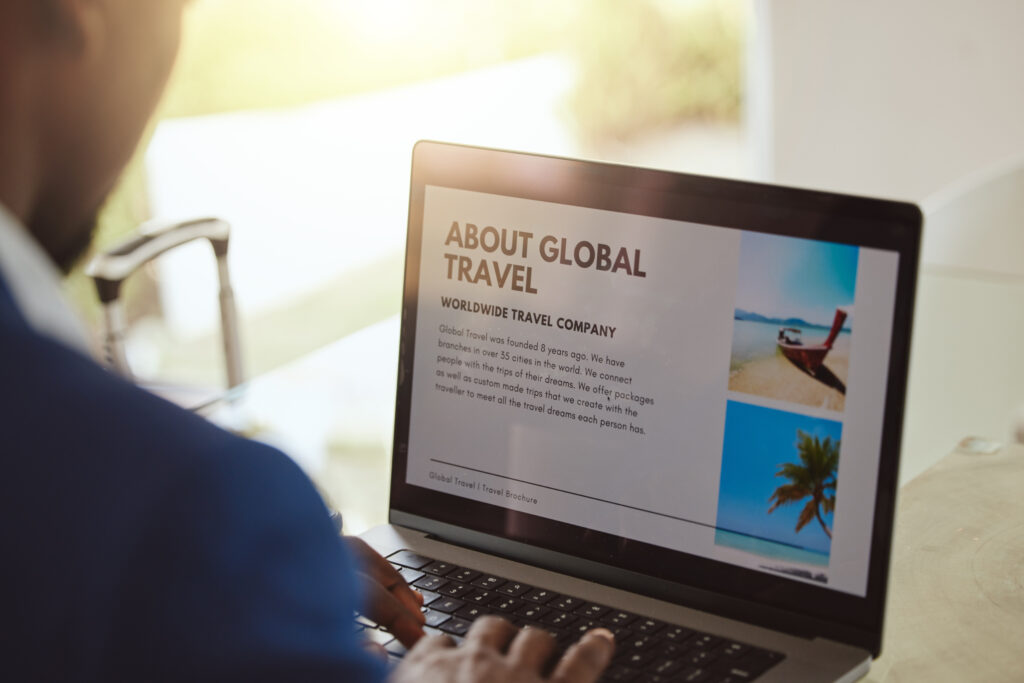Achieving success in the travel industry requires more than stunning destinations and seamless booking systems—it demands that your business is discoverable when travelers search online. That’s where effective SEO services come in. By optimizing your website for search engines, you can attract more travelers, boost bookings, and grow your brand’s visibility. But where do you start, and how do you ensure your SEO efforts deliver real results? This guide will break down everything you need to know about SEO services for the travel industry, offering actionable insights to help your business stand out in a competitive digital space. Let’s get started.
Understanding SEO for the Travel Industry
SEO, or Search Engine Optimization, is the practice of optimizing your website so it ranks higher in search engine results. For the travel industry, this means improving your online visibility to attract travelers.
SEO services for travel industry are crucial because they help drive organic traffic to your site, which can lead to more bookings and inquiries. The key benefits include increased visibility, better targeting of potential customers, and improved website engagement.

In the travel industry, SEO needs to be tailored to specific trends and demands. Seasonal fluctuations impact search behavior, so understanding peak travel times is vital for effective content and keyword strategy.
Geotargeting is also important—many travelers search for services or accommodations near their location. By focusing on local SEO, you can ensure your site appears in local search results, bringing in customers who are actively planning trips to your area.
Building the Foundation of Travel SEO
Keyword Research for the Travel Niche
To build a strong SEO foundation for the travel industry, you need to focus on identifying both seasonal and evergreen keywords. Seasonal keywords reflect trends that change throughout the year, while evergreen keywords remain relevant regardless of time.
Long-tail keywords, on the other hand, are crucial for capturing specific travel queries, helping you reach users with precise, intent-driven searches.
These targeted keywords give you a competitive edge by attracting highly relevant traffic and improving your visibility in search results. Incorporating these into your SEO strategy is essential for long-term success in the travel niche.
At Flying V Group, we specialize in SEO services for the travel industry, helping you boost your online visibility with strategies tailored to your business. Our team excels in conducting in-depth keyword research, from seasonal to evergreen and long-tail terms, ensuring that your content ranks for the right search queries.
Competitor Analysis
Analyzing your competitors’ strategies is key to crafting an effective SEO plan for your travel website. Start by digging into the keywords they target and see which drives the most traffic. Examine their content—what type of posts or pages perform well? Take note of how they structure their site and whether they focus on local SEO or global reach.
To make the analysis easier, tools like SEMrush, Ahrefs, and Moz can give you a clear competitive overview. These tools show you which keywords your competitors rank for, how their backlink profiles look, and where their traffic comes from. With this data, you can spot opportunities and weaknesses, allowing you to adjust your approach.
Optimizing Travel Websites
On-Page SEO Essentials
To optimize your travel website, focus on content that engages visitors, such as blogs and detailed destination guides. These should be informative and optimized with keywords to improve visibility. Offering fresh, valuable content keeps users returning and boosts your search rankings.

Equally important is ensuring your website is mobile-friendly and responsive. Travelers often search on the go, so a seamless mobile experience is crucial for keeping users engaged. Investing in these on-page SEO essentials will improve user experience and enhance your site’s performance—making SEO services for travel industry a must for long-term success.
Technical SEO
When optimizing your travel website for SEO, focusing on technical aspects can significantly boost your visibility. First, ensure your site loads quickly—slow speeds can drive users away and harm your rankings. Next, implement schema markup to help search engines understand your content and display rich snippets, like hotel reviews or flight details.
Lastly, keep your XML sitemaps up to date and make sure your pages are easily indexable. This ensures that search engines can crawl and rank your site effectively. For tailored solutions, consider professional seo services for travel industry to refine your website’s technical foundation.
Content Strategy for Travel SEO
Engaging Content Types
Focus on content types like destination guides, itineraries, and travel tips to boost your SEO efforts. These inform your audience and improve your rankings by targeting key search queries. User-generated content, such as reviews and photos, adds credibility and engagement to your site, encouraging more interaction.
By incorporating these elements, you can create compelling, SEO-friendly content that resonates with your audience and drives traffic. If you’re looking for tailored strategies, SEO services for travel industry can help optimize these content types to maximize visibility and enhance user experience.
Leveraging Multimedia
Multimedia, such as images and videos, is crucial in enhancing the effectiveness of SEO services for travel industry websites. These elements capture attention and provide opportunities to increase engagement and boost rankings. When optimizing media, focus on descriptive file names and alt text, which help search engines understand the content.
Compress images for faster loading speeds and ensure videos are mobile-optimized. By following these best practices, you can improve site performance, enhance user experience, and attract more organic traffic to your travel business while making your content more discoverable.
Local SEO for Travel Businesses
Local SEO is crucial for travel businesses to stand out in your area. By claiming and optimizing your Google Business Profile, you can ensure your business appears in local searches and maps. This not only boosts visibility but also builds trust with potential customers. Optimizing local listings on platforms like Yelp or TripAdvisor further strengthens your online presence.

Encourage your satisfied customers to leave positive reviews and feedback; these reviews enhance your credibility and influence future bookings. For travel businesses, investing in seo services for travel industry is key to attracting more local clients and increasing your business’s reach.
Advanced SEO Techniques
Backlink Strategies
When focusing on backlink strategies for your SEO efforts, outreach is key. Start by contacting tourism boards and travel blogs for backlinks that can boost your authority. These high-quality links from reputable sites can significantly impact your rankings.
Creating shareable content like guides, infographics, and travel tips also encourages others to link to your site naturally. These organic backlinks enhance your visibility and improve your site’s credibility. By incorporating these advanced strategies into your SEO services for travel industry, you’ll see a stronger online presence and better engagement with your target audience.
Leveraging Analytics
To truly excel with SEO, leveraging data from Google Analytics is crucial. By monitoring metrics like traffic sources, bounce rates, and user engagement, you can gain valuable insights into how visitors interact with your site. These insights allow you to fine-tune your strategies for better results.
For example, if certain pages perform poorly, you can adjust your content or improve page speed. Regularly analyzing this data helps you stay ahead of the curve and refine your approach. This is where expert SEO services for travel industry businesses can significantly optimize your online presence.
Staying Ahead of Trends
To stay ahead of trends in SEO services for the travel industry, you need to keep an eye on emerging technologies. Voice search and AI are revolutionizing how travelers find and book trips, so optimizing for these tools is essential.
Additionally, adjusting to post-pandemic travel behavior is crucial—people are now more focused on flexible, personalized travel experiences.
Staying on top of frequent algorithm updates from search engines is also important. These shifts can impact your rankings, so adapting quickly ensures your website remains visible and relevant to travelers. Staying proactive in these areas will give you a competitive edge.
Boost Your Travel Business with Expert SEO Strategies
SEO services for travel industry success require a tailored approach that focuses on keyword optimization, content strategy, and a strong online presence. Implementing these strategies can boost your visibility, attract more customers, and drive sustainable growth. Don’t wait to take action—optimize your digital footprint today and start reaping the benefits.
At Flying V Group, we specialize in SEO services for the travel industry, helping businesses like yours achieve greater visibility and reach the right audience. Our proven strategies are designed to enhance your online presence, increase bookings, and improve ROI. With our experienced team, you can trust that your travel business will thrive in a competitive digital landscape. Get in touch today to learn how we can take your travel brand to the next level.
Frequently Asked Questions
What Are the Best Practices for Keyword Research in the Travel Industry?
Best practices for keyword research in the travel industry involve identifying high-volume, relevant keywords through tools like Google Keyword Planner, SEMrush, and Ahrefs. Focus on long-tail keywords, local search terms, and seasonal trends. Analyze competitor strategies and prioritize user intent to ensure you target the right audience with content that answers their needs.
How Can Travel Businesses Improve Their Local SEO?
Travel businesses can improve local SEO by optimizing their Google My Business profile, ensuring consistent NAP (Name, Address, Phone number) across directories, and using location-based keywords in website content. Encouraging customer reviews, adding local citations, and creating local content can boost visibility in local search results.
What Role Does User-Generated Content Play in Travel SEO?
User-generated content (UGC), such as reviews, photos, and testimonials, enhances travel SEO by increasing engagement and trust. It provides fresh, relevant content that search engines value, helping improve rankings. UGC also promotes social proof, which can influence potential customers and increase conversions by showcasing real experiences.
Why Is Mobile Optimization Crucial for Travel Websites?
Mobile optimization is critical for travel websites because many travelers search for information and book trips on mobile devices. A mobile-friendly site enhances user experience, reduces bounce rates, and boosts rankings on search engines, as Google prioritizes mobile-friendly sites in its algorithm.
How Can Travel Companies Measure the ROI of Their SEO Efforts?
Travel companies can measure SEO ROI by tracking organic traffic, keyword rankings, conversion rates, and revenue generated from organic search. Using tools like Google Analytics, companies can evaluate the impact of SEO strategies on customer acquisition, booking conversions, and long-term brand visibility.






0 Comments